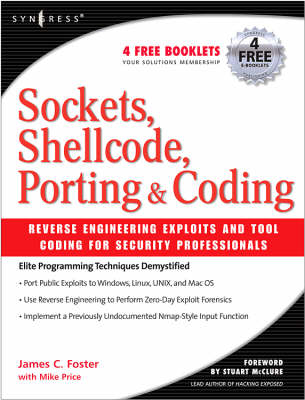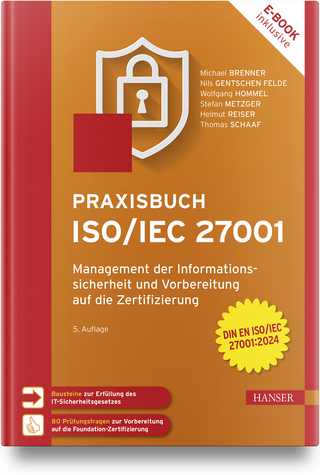
Sockets, Shellcode, Porting, and Coding: Reverse Engineering Exploits and Tool Coding for Security Professionals
Syngress Media,U.S. (Verlag)
978-1-59749-005-4 (ISBN)
The book is logically divided into 5 main categories with each category representing a major skill set required by most security professionals:
1. Coding – The ability to program and script is quickly becoming a mainstream requirement for just about everyone in the security industry. This section covers the basics in coding complemented with a slue of programming tips and tricks in C/C++, Java, Perl and NASL.
2. Sockets – The technology that allows programs and scripts to communicate over a network is sockets. Even though the theory remains the same – communication over TCP and UDP, sockets are implemented differently in nearly ever language.
3. Shellcode – Shellcode, commonly defined as bytecode converted from Assembly, is utilized to execute commands on remote systems via direct memory access.
4. Porting – Due to the differences between operating platforms and language implementations on those platforms, it is a common practice to modify an original body of code to work on a different platforms. This technique is known as porting and is incredible useful in the real world environments since it allows you to not “recreate the wheel.
5. Coding Tools – The culmination of the previous four sections, coding tools brings all of the techniques that you have learned to the forefront. With the background technologies and techniques you will now be able to code quick utilities that will not only make you more productive, they will arm you with an extremely valuable skill that will remain with you as long as you make the proper time and effort dedications.
James C. Foster, Fellow, is the Deputy Director of Global Security Solution Development for Computer Sciences Corporation where he is responsible for the vision and development of physical, personnel, and data security solutions. Preceding CSC, Foster was the Director of Research and Development for Foundstone Inc. and was responsible for all aspects of product, consulting, and corporate R&D initiatives. Prior to joining Foundstone, Foster was an Executive Advisor and Research Scientist with Guardent Inc. and an adjunct author at Information Security Magazine, subsequent to working as Security Research Specialist for the Department of Defense. Foster is also a well published author with multiple commercial and educational papers; and has authored, contributed, or edited for major publications to include Snort 2.1 Intrusion Detection (Syngress, ISBN: 1-931836-04-3), Hacking Exposed, Fourth Edition, Anti-Hacker Toolkit, Second Edition, Advanced Intrusion Detection, Hacking the Code: ASP.NET Web Application Security (Syngress, ISBN: 1-932266-65-8), Anti-Spam Toolkit, Google Hacking for Penetration Techniques (Syngress, ISBN: 1-931836-36-1), and Sockets, Shellcode, Porting and Coding (Syngress ISBN: 1-597490-05-9).
Section 1 – 0-day Basics Introduction ; Security Coding ; NASL ; Section 2 – Networking 0-Day Code Introduction ; BSD Sockets ; Winsock ; Java Sockets ; Section 3 - Shellcode Introduction ; Shellcode Techniques ; Writing Shellcode ; Section 4 – Universal Exploitation Introduction ; Writing Portable Code ; Writing Portable Network Code ; Section 5 - Automation Introduction ; Automating Exploits I ; Automating Exploits II ; Automating Exploits III ; Automating Security Components ; Automating Identification Tools Appendices: A – Glossary ; B - Technical Publications and References ; C - Tool and Application Compedium ; D - LibWhisker Primer ; E - Exploit Archives ; F - Useful Syscalls ; G - The Complete Data Conversion Table
| Erscheint lt. Verlag | 26.4.2005 |
|---|---|
| Verlagsort | Rockland, MA |
| Sprache | englisch |
| Maße | 152 x 229 mm |
| Gewicht | 980 g |
| Themenwelt | Informatik ► Netzwerke ► Sicherheit / Firewall |
| Informatik ► Theorie / Studium ► Kryptologie | |
| Technik ► Elektrotechnik / Energietechnik | |
| ISBN-10 | 1-59749-005-9 / 1597490059 |
| ISBN-13 | 978-1-59749-005-4 / 9781597490054 |
| Zustand | Neuware |
| Haben Sie eine Frage zum Produkt? |
aus dem Bereich


